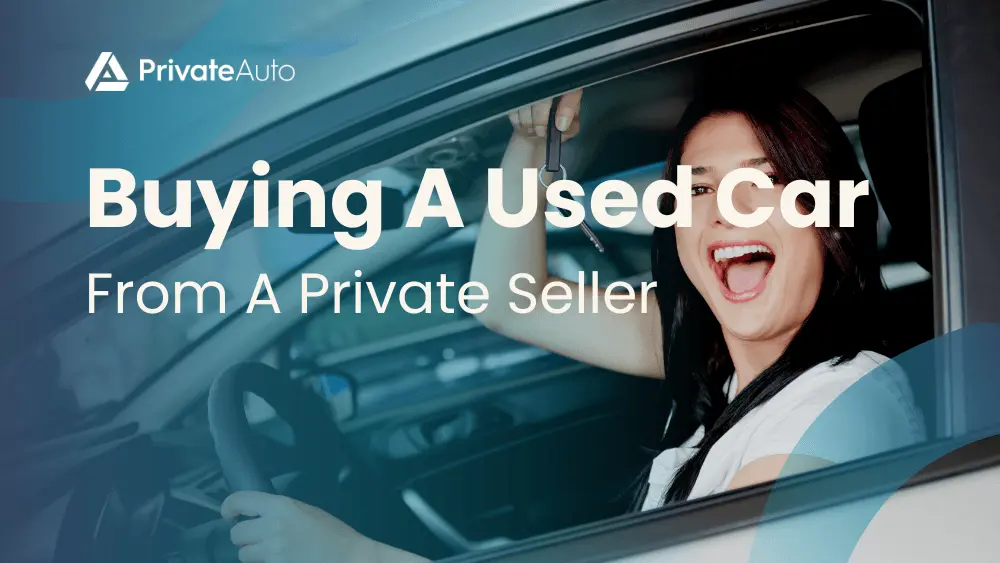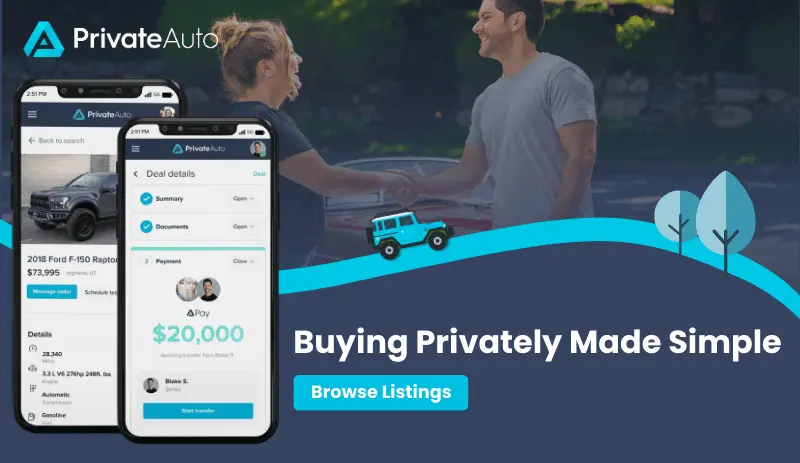What are the Steps to Buy a Used Car From a Private Seller?
1. Determine your budget and vehicle requirements
2. Have funds ready
3. Find the right vehicle
4. Research the car
5. Test drive the car
6. Get an inspection (optional but recommended)
7. Sign the bill of sale (required in some states, recommended for all)
8. Pay for the car
9. Seller signs over the title to you
10. Get car insurance
11. Register the car in your name (at the same time, you’ll complete the title transfer and get new license plates)
First, you need to know what you can afford and what type of car you need. Next, you need to have the money to pay for it. If you can’t afford to pay upfront, you’ll want to secure financing (PrivateAuto allows you to secure a used car loan from our app).
Once you know what you want and how to pay for it—it’s time to go shopping.

Where can I find used cars for sale?
Where to Find Private-Party Cars for Sale
While these websites may have a lot of vehicles listed, they have serious shortcomings. Most of them mix dealer inventory with private sales, making it difficult for you to know whether you’re getting a private-party car or not. Even more importantly, all of them lack basic transactional infrastructure.
We call them “meetingplaces” because they introduce you to a private seller and leave the two of you to navigate all the complexities of the transaction on your own.
PrivateAuto is the world’s first and only fully transactional automotive marketplace, offering self-service technological solutions for every stage of the deal.
We have nothing against other listing sites. If you find the perfect car on one of them, good for you. But we want you to have the transactional security and convenience that our users enjoy.
That’s why DealNow was created. DealNow allows you to start a deal anywhere and instantly transact anytime. The fast-track dealflow includes identity verification, electronic docu-signing, and instantaneous payment. Just create your own private deal room, invite the car seller, and get the deal done.
How can I conduct due diligence?
Research the Car
PrivateAuto has partnered with AutoCheck, which delivers the best value for the price. AutoCheck gets its data from Experian and includes a host of data sources, such as the following:
- State Departments of Motor Vehicles (DMVs).
- Auto auctions
- Salvage auctions
- Collision repair shops
- Service records from maintenance facilitie
- Isnsurance companies
- OEM manufacturers
- Car dealerships and extended warranty companies
- Import and export companies
- Rental and fleet companies
- Vehicle inspection and state inspection stations
Collecting from all these sources, AutoCheck reveals a wealth of info about the car’s history.
- Title history: salvage titles, junk titles, flood damage, hail damage, storm damage, fire damage, and more
- Major repairs
- Regular maintenance (or lack thereof)
- Manufacturer buybacks or lemon titles
- Odometer rollback or not actual miles
- City and state of previous registration, number of owners
- Accidents and damage reports, stolen vehicles
- Rental, taxi, lease, or government use
- Lien information, ownership transfers
- Collision repair history
- Structural or frame damage
- Service, repair, and maintenance performed
- Total loss and reason for the loss
- Stolen vehicles
- Open recalls
- Emissions records
- And a lot more
You could say we’re big proponents of buyers getting a vehicle history report.
Arrange the Test Drive
1. Our in-app scheduler lets you pick from the time slots the seller has chosen—no awkward back-and-forth conversations.
2. You can opt to transact with verified sellers only, which will help weed out those who prefer to operate in the shadows.
You’ll schedule the test drive in a matter of minutes without ever needing to contact the seller. It’s just one of the many ways we streamline the private car buying process.
Do I need a car inspection?
Inspect the Car
Here are some key things to look for in a pre-purchase inspection:
- Fluids: check all fluid levels, including engine oil, transmission fluid, brake fluid, power steering fluid, coolant. Look for leaks and make sure the fluids look clean and at proper levels.
- Tires: examine tire treads and make sure there is sufficient tread depth. Also look for any cracks, bulges or other tire damage. Check the spare as well.
- Interior: make sure all controls, electronics, air conditioning, and heating work properly. Look for any warning lights on the dash when the car is started. Check for water damage, stains, or tears inside.
- Body: check for obvious damage, body panel alignment, uneven gaps, mismatched paint, signs of damage repair. Look closely for any indications of collision repair. Check for rust underneath and around various body panels. Check headlights, brake lights, and other lights.
- Undercarriage: inspect under the car for leaks, rust, damage. Look at brake lines, exhaust, suspension components.
- Maintenance records: review the vehicle history report and check maintenance logs to understand repair and ownership history.
- Test drive: drive the car under different conditions to test acceleration, braking, steering, transmission, and to feel and listen for any mechanical issues.
Sign the Bill of Sale
Fortunately, PrivateAuto has the buyer and seller each e-sign an official state bill of sale within the PrivateAuto mobile app. Both parties then have a record they can forever refer to—securely stored in their PrivateAuto account.
What paperwork do I need?
Sign the Bill of Sale
Fortunately, PrivateAuto has the buyer and seller each e-sign an official state bill of sale within the PrivateAuto mobile app. Both parties then have a record they can forever refer to—securely stored in their PrivateAuto account.
What is the best way to pay for a car?
Pay for the Car
1. Risky
2. Time-consuming
3. Inconvenient
4. Subject to funding limits (usually $5,000)
5. Expensive
To remove payment friction from buying or selling a used car privately, we developed PrivateAuto Pay. After you experience it, you’ll wonder where it’s been all your life.
Here are a few of the advantages of PrivateAuto Pay:
- Instantaneous: you can close a deal in the Walmart parking lot when you meet for a test drive and the seller will get their funds immediately—even if it’s 11:55 on Christmas Eve.
- Fee-free: PrivateAuto does not take a cut of the transaction.
- Available in all US states: no matter where in the US you’re buying or selling a vehicle, PrivateAuto Pay will work for you.
- Large fund transfers: PrivateAuto Pay allows you to send any amount of money.
- Remote transactions: do an over-the-phone deal with a seller in another state via a third-party agent who can be on-site and verify the pertinent details
- Act as your own escrow service with our escrow-like safeguards
Sounds great, right? Our only question: why hasn’t someone come up with this years ago? Better late than never—and here it is.
Signing the Title
Make Sure the Title is Valid
Some criminals will present a valid title for a different car than the one you’re buying. You’ll need to look closely to make sure the title matches the car.
- Make sure the title is for the same make and model, color, year model, and trim type as the car you’re considering.
- Check the car’s Vehicle Identification Number (VIN). Make sure it matches the VIN on the title.
- You can find a car’s VIN on a plate which is located far-forward on the driver’s side dashboard. It’s positioned so you can read it from outside looking through the windshield.
- The VIN may appear on other parts of the vehicle. A decal on the driver’s side door jamb is a common location.
- A vehicle history report can reveal title discrepancies. When you buy with PrivateAuto, you can get a vehicle history from AutoCheck.
Verify All Details On the Title
Here are the fields that most states include in the title. You should doublecheck that each is correct.
- Sale price
- Seller name
- Your name
- Seller address
- Your address
- Mileage (in some states)
- Signatures of both parties with dates
Odometer Disclosure
Check with your state’s Department of Motor Vehicles (DMV) to find out specifics of completing the odometer disclosure—and whether your state requires any additional paperwork.
Get Car Insurance
If you’ve recently sold a car, you can probably transfer your policy to the car you just bought. Talk to your insurance agent about options.
If you don’t have insurance, PrivateAuto allows you to compare rates and get a competitive insurance policy from our app. Super convenient.
Registration, Title Transfer, and License Plates
- Register the vehicle in your name. Present the certificate of title signed by the original owner, as well as the signed bill of sale and proof of insurance.
- Transfer the title into your name in the state records. Our complete title transfer guide shows you what’s involved.
- Get temporary license plates (or temporary tags) so that you can drive the car while you wait for your new license plates to arrive in the mail.
- Order new license plates unless you’re in California or Minnesota (most states require the seller to remove the plates).
- Pay taxes and fees. Unless you live in a state with no sales tax, you’ll need to pay tax on the purchase price of your recently-bought car. Used car sales taxes vary by state; for example, Alabama has a 2% car sales tax, Nevada charges 8.1%, California charges 7.25%, Oregon has no vehicle sales tax, and New York levies a 4% vehicle sales tax. Depending on your location, you may have to pay additional local taxes and fees levied by counties or municipalities.
State-Specific Guides
Used Car FAQ
When I buy a used car from a private seller, can I drive it home?
Check with the DMV in your state. Most states allow a short window in which you can drive a private-party car home after purchase, without being in violation of the law. You’ll then need to register with the state and get temporary tags.
How do you know if a private car seller is legit?
Doing business with individuals who have verified their identities helps cut down on scams. On PrivateAuto, sellers and buyers go through identity verification.
Should I give someone my VIN number?
If you are a seller, and a potential buyer asks for your VIN, give it to them. They are trying to do due diligence on your vehicle. The VIN is not sensitive info. It’s in plain view on your car dashboard for anyone to see.
What is the most secure form of payment when selling a car?
The most secure form of vehicle payment is one that is instantaneous, secure, and convenient. There is only one method that meets all these criteria, and it is PrivateAuto Pay, our integrated payment gateway.
Is it risky buying a car from a private seller?
Buying from a private car seller can involve some risk, but there are ways to significantly reduce the risk. You can avoid giving out personal info, pay securely through PrivateAuto Pay to avoid sharing banking info, and deal only with sellers who have undergone identity verification.
What is the smartest way to pay for a car?
PrivateAuto Pay is the smartest way to pay for a car, as it is safe, secure, convenient, and instantaneous. Whether you are buying classic cars or a reliable family workhorse, PrivateAuto pay will cover any vehicle purchase with no funding limits, instant transfers, and lack of transfer fees.
What should I ask for when buying a car from a private seller?
When buying a car from a private seller, you should ask for the VIN so you can run a vehicle history report. Or, if you are using PrivateAuto, a vehicle history report should already be part of the seller’s vehicle listing. We’ve written an article about other questions you may want to ask, so check that out!

Andy Lewis
Contributing Author
Andy Lewis is the Chief Technology Officer (CTO) at PrivateAuto, bringing over 30 years of expertise in the technology field to the forefront of the online marketplace….

